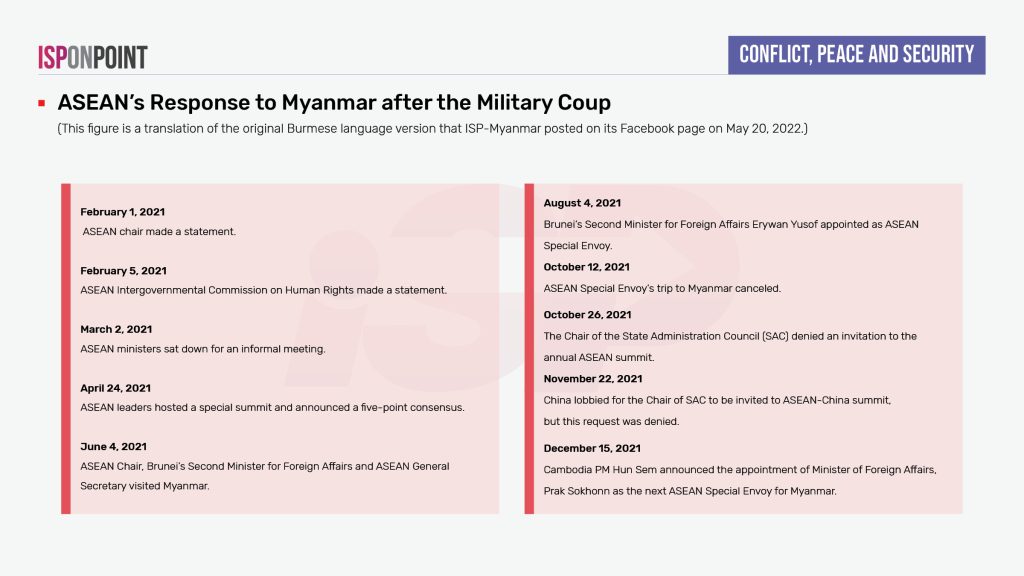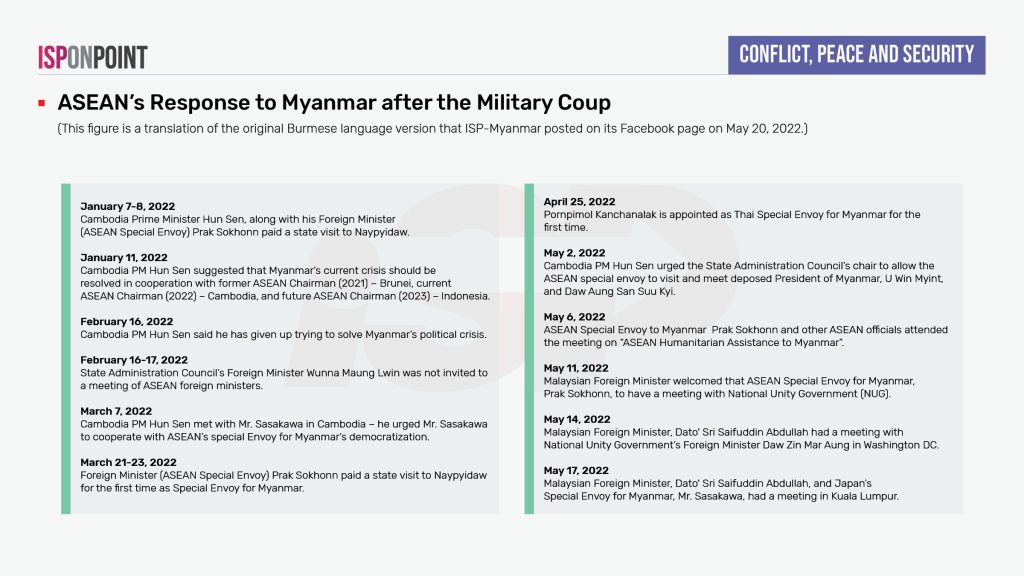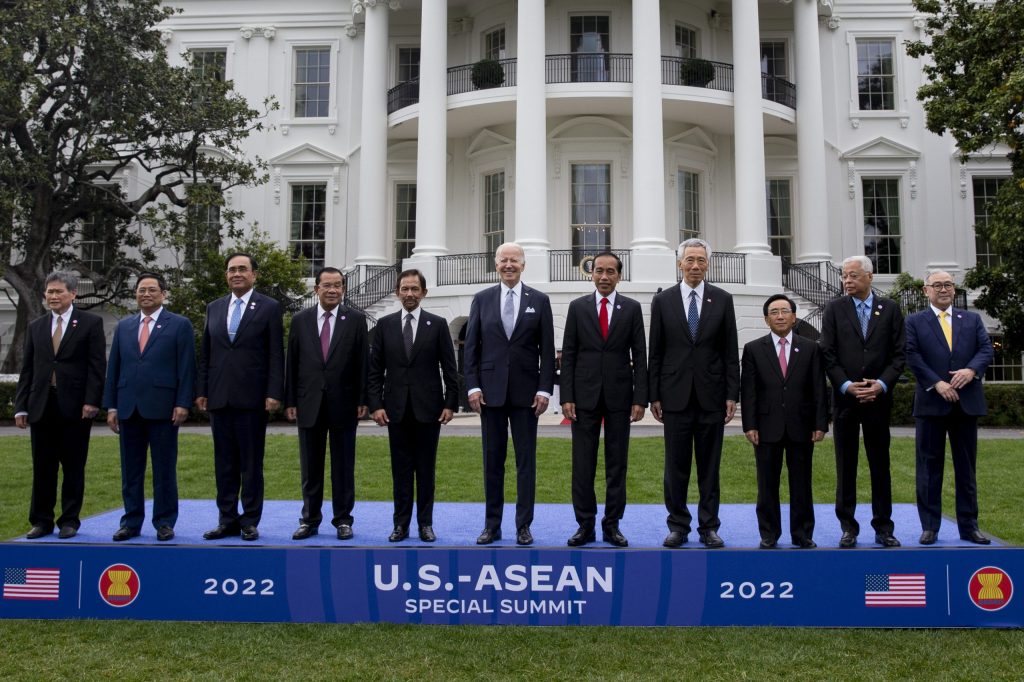On Point No. 10
(This article is a translation of the Burmese language version that ISP-Myanmar posted on its Facebook page on May 20, 2022.)
∎ Events
The ASEAN-U.S. Special Summit 2022 took place on May 12-13 in Washington, D.C. Sr. Gen. Min Aung Hlaing, chairman of the State Administration Council (SAC), was not invited to attend. U.S. officials did invite Ms. Zin Mar Aung, foreign minister of the opposition National Unity Government (NUG), who met with U.S. Deputy Secretary of State Wendy Sherman and other senior U.S. officials during the summit. Zin Mar Aung also met with her Malaysian counterpart, Foreign Minister Saifuddin Abdullah.
∎ Preliminary analysis
The U.S.-ASEAN Special Summit addressed ways and means to improve cooperation between ASEAN countries and the U.S. in areas that include security and economic development. At the same time, the Biden administration has indicated a desire to weaken Chinese influence on ASEAN countries, a strategy that might not achieve its intended results. ASEAN countries are well aware of the consequence of taking sides in the China-U.S. rivalry. Instead, they want a balanced relationship with both, which appears to be the geopolitical strategy of many countries in the world today.
Many countries oppose Russia’s invasion of Ukraine because it violated the principle of national sovereignty as well as international norms and laws. However, not all countries that opposed the invasion agree with the way U.S.-led western countries have characterized the conflict as a battle between dictatorship and democracy, or as a means of politically undermining Russia. Similarly, many countries cannot accept the rule of a ruthless dictatorship in Myanmar that lacks the popular support of the people. Yet, ASEAN’s member countries do not want to leverage Myanmar’s political situation to undermine China’s role within the ASEAN bloc. It is telling that the joint statement issued at the conclusion of the U.S.-ASEAN summit did not include any strong words about the crisis in Ukraine or in Myanmar.
The U.S. and its western allies have imposed sanctions and other punitive measures on Myanmar’s ruling junta, which refuses to respect the voices of its citizens and commits unspeakable atrocities and human rights abuses. Even harsher measures against them could be imposed, but these efforts are not likely to produce a sustainable political solution for Myanmar that recognizes all stakeholders as acceptable partners. Many countries are constrained by strategic interests or the lack of such interests. ASEAN countries still maintain the principle of “ASEAN centrality” with respect to Myanmar’s ongoing political crisis. They want ASEAN to resolve the crisis on the basis of its stalled Five Point Consensus.
ASEAN member states have different perspectives on the situation in Myanmar. The lack of a comprehensive and coordinated approach could make the situation increasingly intractable for the foreseeable future. Rather than identifying a sustainable solution, the U.S.-ASEAN summit seems to be more about giving the impression of progress rather than making any substantive headway. It is an episode that reveals “more smoke than fire.” The truth is that neither U.S. or ASEAN leadership can successfully resolve the problems in Myanmar. Attempting to do so only leads to distraction and false hope among Myanmar’s people.
∎ Scenario forecast
Future meetings could take place between U.S.-ASEAN officials and representatives of the opposition National Unity Government (NUG). However, it is unquestionably impossible for them to recognize the NUG as the official government of Myanmar and to free up US$1 billion in funds restricted by the U.S. government following the military coup. Any attempt to do so could affect diplomatic relations with individual ASEAN countries and across the region, though it would not likely prompt discussion of expelling Myanmar from the regional body.
In short, the crisis in Myanmar cannot be resolved without the involvement of key regional powers, including China. As ISP-Myanmar previous noted in OnPoint No. 8, envoys from the United Nations, ASEAN, China, and Japan must collaborate on resolving the crisis in Myanmar with the help of other global powers including India and the United States. More importantly, envoys from all these countries must listen to the voice of Myanmar’s people and understand their aspirations. Only then can the crisis have any chance of a successful resolution. If the international community lacks the effective leadership or political will to do this, Myanmar will be left with only the superficial progress and false hopes of the U.S.-ASEAN Special Summit, which will never lead to a practical resolution to the current deadlock.


➥ ISP’s OnPoint No.8 on “International Efforts to Solve the Myanmar Crisis: A Possible Playground for Global Superpowers?” (March 12, 2022) can be accessed at:
https://www.ispmyanmar.com/international-efforts-to-solve-the-myanmar-crisis-a-possible-playground-for-global-superpowers/

